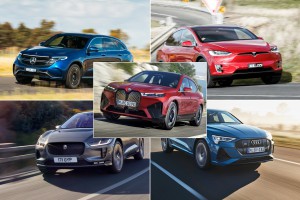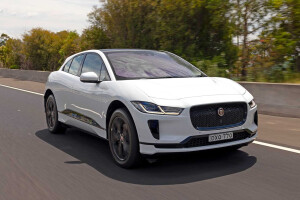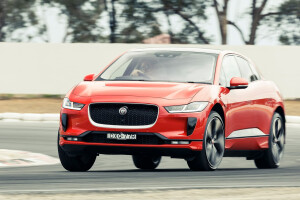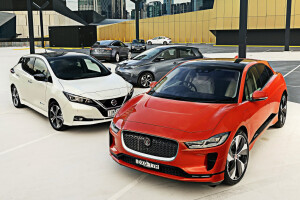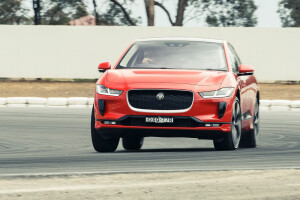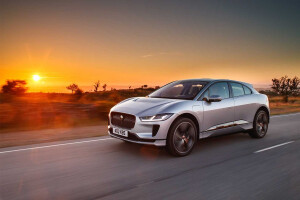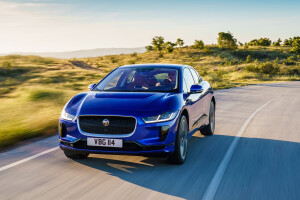Latest Review
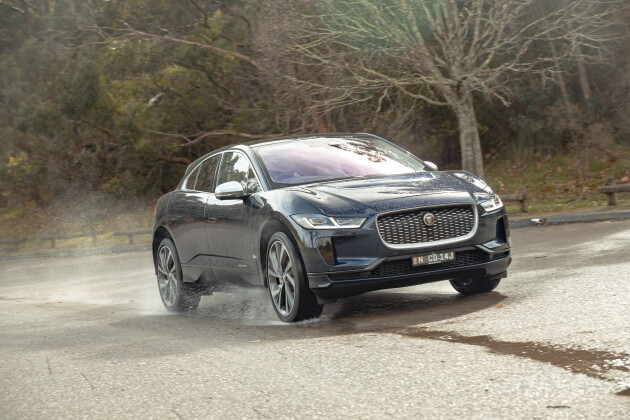
First drive: 2021 Jaguar I-Pace EV400 S
Now charges even quicker, but at a price
If you assess the Jaguar I-Pace on paper, depending on your worldview, you get two different answers to what it is. From the badge alone it can understandably be pigeonholed as a luxury SUV with a strong focus on efficiency and comfort above all else.
Peer over the specs sheet and you get the idea that things aren’t so simple. Near enough 300kW and 700Nm, all-wheel drive, and a 0-100km/h sprint of four point something seconds. That’s real performance car stuff.
But what works in theory doesn’t always translate to the real world. Could the I-Pace be the most overlooked performance car on sale in Australia?
Updated for 2021, the electric Jag has received some tweaks, mainly to do with infotainment, home-charging solutions, and additional exterior styling options. We have the cheapest of the identically-powered three-variant range, the S, on test, which starts at $127,620 – a chunky $4760 increase for this model year.
That means when you compare the I-Pace against traditional ICE rivals like the Audi SQ5 TFSI ($101,136), BMW X3 M40i ($113,900), and Mercedes-AMG GLC 43 ($120,600) it’s already at a bit of a price disadvantage. However, none of those listed can match the Brit in terms of power.
It’s a well-sung hymnbook now, but the big benefit of the electric powertrain is the immediacy of its response. With a 90kWh battery, and an electric motor on each axle, the I-Pace uses its 294kW and 696Nm outputs to great effect. Some of the greatest atmo engines available today can only dream of responding to throttle inputs with this kind of urgency.
"The I-Pace steps off the line with a solid whoomph rather than a vicious whack"
For an EV, the straight line acceleration is nothing extreme. A claimed 0-100km/h time of 4.8 seconds is half a second slower than its supercharged 5.0-litre V8 sibling, the F-Pace SVR, and the I-Pace steps off the line with a solid whoomph rather than a vicious whack. Top speed is limited to 200km/h, and the I-Pace is running out of puff north of 130km/h, but it focuses more on deploying power effectively at speeds that will keep your local constabulary happy.
Unlike others in the electric realm, the I-Pace will relish being driven enthusiastically in a manner that isn’t just straight-line acceleration. By taking an ‘if it ain’t broke’ mentality to the mechanicals, Jaguar’s engineers have preserved the I-Pace’s dynamic personality and we’re all the better for it.
Pirelli P-Zero rubber on all four corners, measuring 255/40/R22, should be an indicator that JLR’s engineers spent plenty of time finessing the I-Pace on Gaydon’s ride and handling course – penned by Apex Circuit Design no less.
The high-speed stability is fantastic, with the I-Pace staying planted and confident through fast sweeping bends as the speedo climbs unrelentingly toward corner exit. Grab it by the scruff of the neck in slower bends and the I-Pace doesn’t shrink away, instead rewarding you with an engaging front end that dives into the corner.
The ESC system has been nicely calibrated, allowing you to get aggressive on corner entry, with some extra slip helping rotate the car without constant nannying or interventions. With all the systems on you won’t be getting any power oversteer, but at the same time it takes serious effort on the behalf of the driver to force the I-Pace into understeer. As a twin-motor set-up, the I-Pace deploys torque vectoring via the braking system, slowing wheels as needed to help pull you into bends.
Despite there being no physical connection between the front wheels and what you hold in your hand, the steering is well weighted. It’s direct, accurate, and with 2.5-turns lock-to-lock hits the sweet spot in terms of its ratio.
The most disconcerting part of the driving experience is the lack of sound, which leaves you underestimating exactly how fast you are travelling as the I-Pace leaps from one bend to the other. Thankfully, the optional head-up display lets you keep track without taking your eyes too far off the road. You’ll want to keep tabs on the speeds as well, as probably the biggest shortcoming in the I-Pace’s surprising performance CV are the standard friction brakes which could do with extra bite – particularly for a vehicle with a two-tonne plus kerb weight.
Handy then, that you can ratchet up the regenerative braking to assist. At its maximum regen setting, the I-Pace can be driven hard almost exclusively using a single pedal.
Given our car was riding on optional 22-inch wheels, the I-Pace’s ride is surprisingly supple. The air-suspension avoids low frequency heaving even in its comfort setting, retaining decent compliance with confident rebound damping. Body control is taut but unperturbed by nasty mid-corner bumps.
Overall the I-Pace nestles into a comfortable middle ground between everyday refinement and dynamic poise and ability. With its low centre of gravity, it doesn’t suffer that oversprung hard edge sometimes engineered into performance SUVs for body control purposes, its comportment being more akin to that of a fast wagon.
It makes for a great daily driver with an interior that is trimmed generously with leather, aluminium and other high-end materials. Updated for 2021 is the dual 10- and five-inch upper and lower touchscreens for infotainment and climate controls. A 12-inch fully digital instrument cluster is clean, simple, and well-executed.
The entire infotainment system has been refreshed to more closely mimic the design found on modern smartphones, while two phones can be connected via Bluetooth at the same time. Wireless charging can be added as an optional extra, and Apple CarPlay and Android Auto are standard fit. The I-Pace’s charging, battery management, and infotainment systems can all now also be updated over-the-air.
The front seats have a bucket design with good lateral support for both the upper and lower body. Despite the remarkably thin back, which aids the already ample rear legroom, the front pews don’t sacrifice much in the way of noticeable comfort in the process.
The inside of the I-Pace is a great place to spend time, with the huge optional fixed panoramic roof giving the entire interior a light and airy feel. The standard Meridian sound system is also a quality item, with surprisingly clean reproduction even on lossy music file formats.
A surprising benefit of the electric powertrain is that it allowed JLR’s designers and engineers to push the I-Pace’s wheels as far to the fore and aft of the car as possible, resulting in a huge wheelbase of almost three metres (2990mm, or just 45mm less than a 2020 Mercedes S-Class).
This not only means rear occupants are catered for with ample legroom, but it pushes the driver forward in the car, giving you impressive vision and visual engagement, and helping you to better position this large car on the way into a corner.
In a boon for those charging at home (which will be nigh-on 100% of owners), the onboard three-phase AC system has been upgraded to 11kWh from 7kWh, cutting complete charging time from 13 hours to 8.6, and now adds 53km of range per hour.
There are plenty of compelling reasons to want to add an I-Pace to your shortlist of new car options, but something to remember is that options (and there are many) will quickly transform an already premium price tag into something altogether more expensive.
Our loan vehicle was optioned to $164,142 as-tested, with much of its nicer features hidden in the options list. Those wonderful front seats, $8450. The panoramic roof will set you back $3580, and the head up display is $1040 on its own. However, those are relative ‘nice to haves’. I’d strongly encourage potential I-Pace buyers to tick the boxes for Adaptive Dynamics ($2405) and Electronic Air Suspension ($2002) at a minimum.
The I-Pace is unlike traditional performance benchmarks in some ways, but there’s a reassuring familiarity to its willingness, nay eagerness, to be grabbed by the scruff of the neck and be driven hard. It may go unnoticed by many for its subdued looks and electric drivetrain but if it’s an indicator of our performance car future, things aren’t all too bad after all.
2021 Jaguar i-Pace EV 400 S specs
News
-
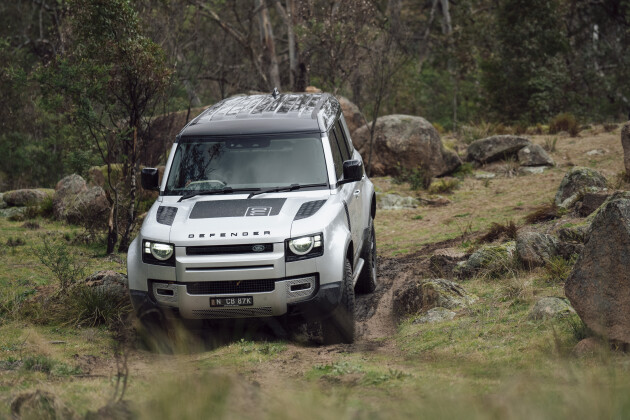 News
NewsJaguar and Land Rover prices increase across 2023 range
The marque has adjusted pricing and features across its line-up for 2023
-
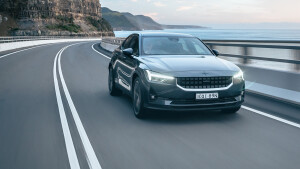 Advice
AdviceThe electric vehicles you can buy in Australia
Our rapid-fire snapshot of every new electric vehicle currently on sale in Oz
-
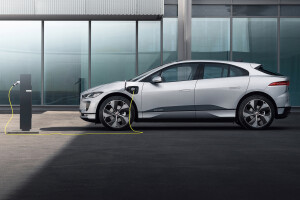 News
NewsMagna International to produce electric platform for JLR, pick-up conversions in US
The Canadian electric vehicle specialist is looking to diversify across the industry
-
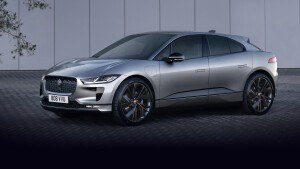 News
News2023 Jaguar I-Pace pricing and features for Australia
Jaguar’s electric SUV gains Amazon Alexa functionality and a new black pack
-
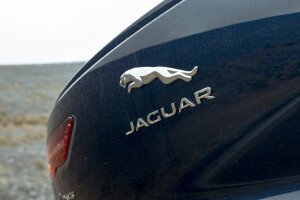
Jaguar announces in-house electric vehicle platform
-
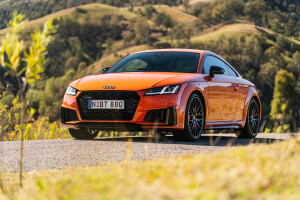
The ten best unlikely driver’s cars you can buy
-
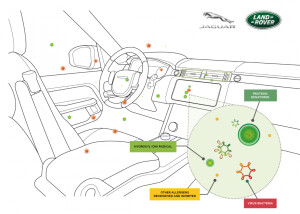
Jaguar Land Rover kills COVID with climate control
-
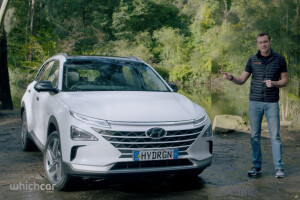
The stories behind our WhichCar TV EV special


